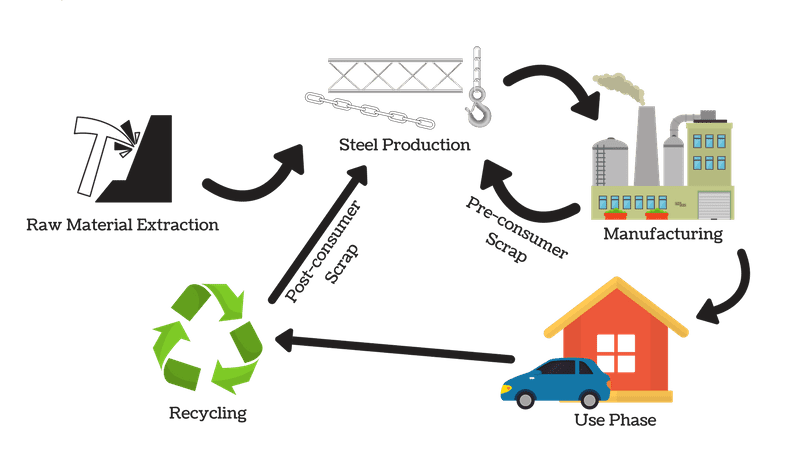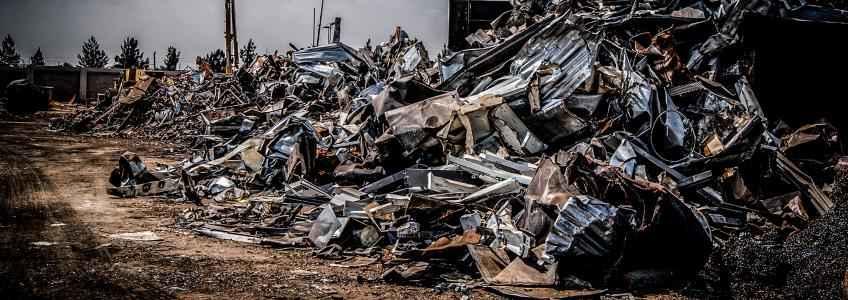Sustainability & Environmental Impact of Scrap Metal Recycling
Scrap metal recycling has a significant environmental impact by reducing the need for new raw materials and minimizing greenhouse gas emissions. This process contributes to a more sustainable future by conserving natural resources and reducing environmental concerns associated with mining and metal extraction.
Energy Conservation and Reduced Emissions
One of the primary environmental benefits of recycling scrap metal is the substantial reduction in the energy required compared to producing new metals from raw materials. The recycling process uses considerably less energy than mining and processing virgin ore. For instance, recycling aluminum saves up to 95% of the energy needed to produce it from bauxite ore. Similarly, recycling steel saves about 60% of the energy required for steel production from iron ore.
The reduction in energy consumption directly correlates with lower greenhouse gas emissions. The scrap recycling industry plays a crucial role in mitigating climate change by cutting down the emission of carbon dioxide and other greenhouse gases. By reducing the reliance on energy-intensive processes, recycling metal helps decrease the overall carbon footprint of metal production.

Conservation of Natural Resources
Scrap metal recycling helps conserve natural resources such as iron ore, coal, and bauxite. These materials are finite, and their extraction often leads to habitat destruction, soil erosion, and water pollution. By recycling metals like steel, aluminum, and copper, we can significantly reduce the demand for these raw materials, preserving them for future generations.
The process also minimises the need for mining, which is often associated with significant environmental concerns. Mining operations can lead to air pollution, toxic chemical leaks, and extensive landfill creation. By recycling scrap metal, we reduce the pressure on mining operations, leading to fewer disturbances to the earth and its ecosystems.
Waste Reduction and Management
Recycling scrap metal contributes to better waste management by diverting materials from landfills. Metals from old appliances, construction debris, and other sources can be recycled instead of being discarded. This not only reduces the volume of waste but also minimises the potential for soil and water pollution caused by metals breaking down in landfills.
Also recycled metals can be used in various applications, reducing the need to produce new products from virgin materials. For instance, recycling steel and recycling aluminum can significantly decrease the environmental burden of manufacturing these metals. This creates a circular economy, where materials are continuously reused, contributing to a more sustainable future.
Economic Benefits and Job Creation
The scrap metal industry provides substantial economic benefits by generating revenue from recycled materials and creating jobs. The recycling industry employs thousands of workers in collecting, sorting, processing, and selling scrap metals. This not only supports the economy but also promotes environmental sustainability.
By reprocessing scrap metal, industries can reduce production costs associated with extracting metals from natural resources. The economic benefits extend to consumers as well, as products made from recycled materials are often cheaper than those made from new raw materials.
Reduction of Environmental Pollution
Processing scrap metal reduces the amount of air pollution and toxic chemicals released into the environment. Mining and refining new metals often involve the use of hazardous substances that can leach into the soil and water, posing risks to human health and the environment. Recycling eliminates many of these steps, resulting in less contamination and fewer health hazards.
Additionally, scrap yards are designed to handle metal waste safely and efficiently, preventing toxic chemicals from entering the environment. By adhering to strict environmental standards, the scrap recycling industry minimizes the risk of pollution and promotes safer handling of materials.
Impact on Climate Change
Scrap metal recycling plays a vital role in combating global warming. By reducing the need for energy-intensive metal production and lowering greenhouse gas emissions, recycling helps slow the rate of climate change. The reduced carbon footprint of recycled materials compared to new raw materials is significant, making metal recycling a key strategy in global environmental policies.
Promoting a Sustainable Future
The shift towards a more sustainable future is heavily reliant on efficient recycling practices. By continuously recycling scrap metal, we not only conserve resources and reduce emissions but also foster a culture of sustainability. This ensures that today’s world can meet its material needs without compromising the ability of future generations to meet theirs.
Encouraging Recycling Practices
Promoting the recycling of scrap metal involves raising awareness about its environmental benefits. Individuals and businesses need to be educated on the importance of recycling metal and the positive impacts it has on the environment. Encouraging the use of recycled materials in manufacturing and construction can drive demand for recycled metals, further supporting the scrap recycling industry.
Final Points
The environmental impact of scrap metal recycling is profound, offering numerous benefits such as energy conservation, natural resource preservation, waste reduction, and pollution control. By embracing recycling, we can significantly reduce the carbon footprint of metal production, promote economic growth, and ensure a healthier planet for future generations.
The scrap metal industry is a cornerstone of a circular economy, contributing to a more sustainable future where materials are reused and conserved for the betterment of the environment.

